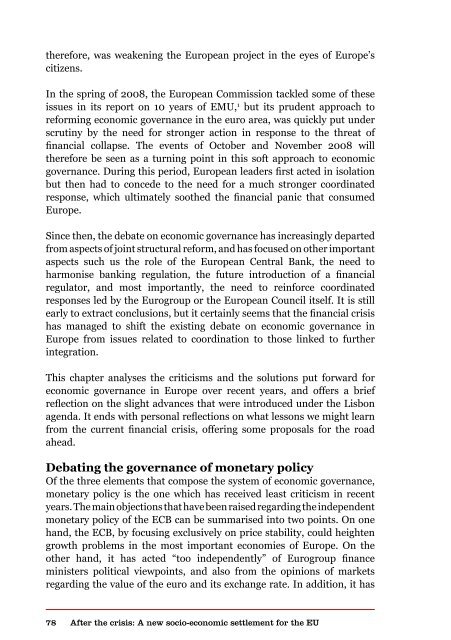Authors Iain Begg | Gabriel Glöckler | Anke Hassel ... - The Europaeum
Authors Iain Begg | Gabriel Glöckler | Anke Hassel ... - The Europaeum
Authors Iain Begg | Gabriel Glöckler | Anke Hassel ... - The Europaeum
You also want an ePaper? Increase the reach of your titles
YUMPU automatically turns print PDFs into web optimized ePapers that Google loves.
therefore, was weakening the European project in the eyes of Europe’s<br />
citizens.<br />
In the spring of 2008, the European Commission tackled some of these<br />
issues in its report on 10 years of EMU, 1 but its prudent approach to<br />
reforming economic governance in the euro area, was quickly put under<br />
scrutiny by the need for stronger action in response to the threat of<br />
financial collapse. <strong>The</strong> events of October and November 2008 will<br />
therefore be seen as a turning point in this soft approach to economic<br />
governance. During this period, European leaders first acted in isolation<br />
but then had to concede to the need for a much stronger coordinated<br />
response, which ultimately soothed the financial panic that consumed<br />
Europe.<br />
Since then, the debate on economic governance has increasingly departed<br />
from aspects of joint structural reform, and has focused on other important<br />
aspects such us the role of the European Central Bank, the need to<br />
harmonise banking regulation, the future introduction of a financial<br />
regulator, and most importantly, the need to reinforce coordinated<br />
responses led by the Eurogroup or the European Council itself. It is still<br />
early to extract conclusions, but it certainly seems that the financial crisis<br />
has managed to shift the existing debate on economic governance in<br />
Europe from issues related to coordination to those linked to further<br />
integration.<br />
This chapter analyses the criticisms and the solutions put forward for<br />
economic governance in Europe over recent years, and offers a brief<br />
reflection on the slight advances that were introduced under the Lisbon<br />
agenda. It ends with personal reflections on what lessons we might learn<br />
from the current financial crisis, offering some proposals for the road<br />
ahead.<br />
Debating the governance of monetary policy<br />
Of the three elements that compose the system of economic governance,<br />
monetary policy is the one which has received least criticism in recent<br />
years. <strong>The</strong> main objections that have been raised regarding the independent<br />
monetary policy of the ECB can be summarised into two points. On one<br />
hand, the ECB, by focusing exclusively on price stability, could heighten<br />
growth problems in the most important economies of Europe. On the<br />
other hand, it has acted “too independently” of Eurogroup finance<br />
ministers political viewpoints, and also from the opinions of markets<br />
regarding the value of the euro and its exchange rate. In addition, it has<br />
78<br />
After the crisis: A new socio-economic settlement for the EU

















